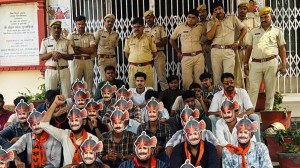Jamiat revives proposal for separate madrasa board
Stakeholders from the Muslim community have proposed to set up their own madrasa board,a marked departure from their stand on the matter so far.
Stakeholders from the Muslim community have proposed to set up their own madrasa board,a marked departure from their stand on the matter so far.
A delegation of the Jamiat-Ulama-i-Hind recently met Union Human Resource Development (HRD) Minister Kapil Sibal and said they wanted to set up a board for madrasas modelled on the Council for the Indian School Certificate Examination.
The delegation requested the government to recognise the board when it is formed. The HRD Ministry is learnt to have assured the matter will be given priority.
Seminaries and politicians had earlier shot down the much-debated proposal for a madrasa board.
The move by the Jamiat comes at a time when the need to bring madrasa students to the mainstream education system has been felt as keenly as ever and all attempts by the government to do so have fallen flat.
The HRD ministry now hopes there may be a way forward with people from the community itself expressing the need for a such a board.
The dismal enrolment rate of Muslims in higher education explains the urgent need to bring madrasa students to the mainstream.
A UGC report on socio-religious enrollment in higher education notes that while the gross enrolment ratio is the highest for Christians at 19.85 per cent,Hindus come next at 13.13 percent and Muslims are at the bottom at just 7.7 per cent. The huge gap between Muslims and other communities in the study led to changes in the education policy.
While the ministry put madrasa certificates on a par with CBSE certificates,it is widely felt that a separate board could help understand their need better.
The UPA government had pushed for a central madrasa board both in its first term with Arjun Singh as the HRD minister and now with Kapil Sibal. But both failed with the community rejecting the move.
Sibal had also tried to mobilise political opinion on the matter but with little result.
Some Muslim MPs had rejected the proposal; others felt the proposed composition of the board was not representative enough.
- 01
- 02
- 03
- 04
- 05































